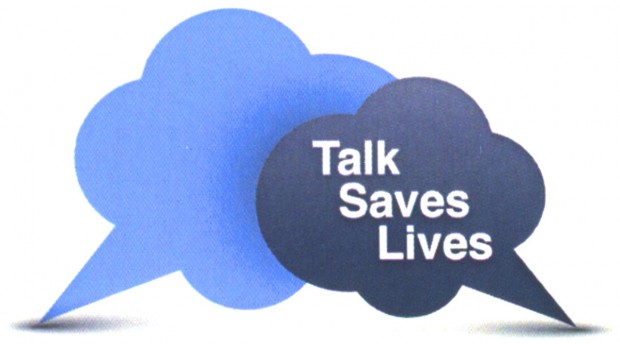Talk Saves Lives: Suicide Prevention in our Communities

The numbers are scary: Every year, more than 42,000 people in the U.S. die by suicide; 800,000 worldwide. That means every 40 seconds, someone dies by suicide.
Just this summer, three young adults from Buzz-area neighborhoods took their own lives. Over the past 16 months or so, we know of at least 9 community members – all under the age of 36 – who have died by suicide.
Talk saves lives
This horrifying “epidemic” recently caused some members of the Jewish community to create a coalition of individuals and organizations to take action toward suicide prevention. Last night, “Talk Saves Lives” held at Congregation Emanu El, co-chaired by Gail and Norman Stalarow, brought together many individuals of all ages to start the conversation. This event was the first in a series of programs, events and initiatives aimed to address suicide prevention in the community.
Gail and Norman introduced the evening and emphasized the importance of getting past the stigma of mental health. A common metaphor shared throughout the evening was that we should all start thinking of mental health similar to physical health - like cancer or heart disease, mental illness is not an individual’s fault, but requires both treatment and prevention.
“We need to talk about it, help one another and recognize the need for help,” said Norman.
Rabbi Samantha Kahn from Congregation Emanu El put it simply: “We are here because our hearts are shattered,” she said. “These are not isolated events. There’s too much suffering and not enough talking about it.” Talk and support can and will save lives, she said.
“Talk does save lives,” echoed guest speaker M. Brenda Fitch, CCW, LAC from The American Foundation for Suicide Prevention’s Southeast Texas Chapter. “You can prevent suicide - believe it or not, each one of you plays an important role in suicide prevention.”
One common myth, she said, is that if you talk to an individual about suicide, you’ll “plant that seed” and potentially cause suicide. This is a myth. Talking about it and recognizing warning signs is key to preventing suicide.
Warning signs can include:
- Changes in behavior: For example, increased use of alcohol or drugs, insomnia, acting recklessly, withdrawing from activities, isolation from family and friends, looking to give away prized possession
- Changes in mood: For example, depression, apathy, rage, irritability
- The mention of suicide: An individual saying they don’t think they can go on or have mentioned wanting to die
Reach out to each other
“Trust your gut,” Brenda said. “You don’t have to be an expert. Assume you’re the only one who’s going to reach out.”
If you have that “gut feeling,” reach out to the individual and talk about the behavior you’ve observed that’s worrying you. Express concern and caring. Help them find a professional who can help them.
Only one in five people with a mental health condition seeks treatment. There is still so much stigma in our society about mental health treatment. “Make it a subject on family night,” Brenda suggests. She also suggests talking to friends about it and helping each other with self-care - exercise, a healthy diet, sleep, stress management – all of which can help strengthen mental health.
Upcoming initiatives
Linda L. Burger, CEO, of Jewish Family Service, talked about some of the upcoming initiatives, programs and opportunities available for the community.
- Mental Health America will be teaching “Mental Health First Aid” classes to train individuals to help others as a “band-aid” until professionals can be brought in.
- There will be a support group for parents who have lost a child by suicide, either recently or in the past.
- There will be an opportunity for individuals who are skilled at research to help compile a guide of up-to-date, helpful information on this topic.
- Young professionals - save the date for “Stamp Out Stigma” on Nov. 20, a panel discussion about suicide and mental health, planned by and for Jewish young professionals.
Helpful resources include:
- Houston Crisis Hotline: 713-970-7000 or 866-970-4770
- Crisis Intervention: 832-416-1177
- Teen Talk: (call) 832-416-1199; (text) 281-201-4430
- Youth Crisis Hotline: 800-448-4663
- Suicide Prevention Lifeline: 1-800-273-TALK
- For any emergencies, please call 911
Please join the conversation by leaving a comment below with your thoughts or any additional resources. We’d be happy to add to this list.
Related reading:
- Community must confront cause of too many untimely deaths by Michael C. Duke, Jewish-Herald Voice
- Suicide prevention begins with “Talk Saves Lives” by Michael C. Duke, Jewish-Herald Voice
- Breaking the Chains: How two Buzz residents battled addiction by Cathy Gordon
- Tackling Grief: Living life jelly side up by Cathy Gordon
- Bipolar Disorder: How we lost Alex by Michelle Groogan
- Not OK? That’s OK: Normalizing mental-health struggles by Allie Burrow
- Surviving Grief During the Holidays by Michelle Groogan
Editor’s Note: Thank you to all involved in the “Talk Saves Lives” program. We think this is an incredibly important initiative.
Want more buzz like this? Sign up for our Morning Buzz emails.
To leave a comment, please log in or create an account with The Buzz Magazines, Disqus, Facebook, or Twitter. Or you may post as a guest.



